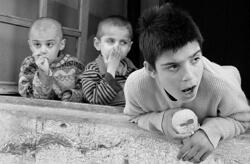Degeneracy
 Degeneracy - this is not a common common offensive word, it is a pathology from a number of oligophrenia, manifested in its easiest degree. Degeneracy can be diagnosed only up to three years of age and this gap is assumed not only because of the exceptional characteristics of the disease, but also because of the difficulties previously diagnosed by the intellectual level.
Degeneracy - this is not a common common offensive word, it is a pathology from a number of oligophrenia, manifested in its easiest degree. Degeneracy can be diagnosed only up to three years of age and this gap is assumed not only because of the exceptional characteristics of the disease, but also because of the difficulties previously diagnosed by the intellectual level.
Debility, idiocy, imbecility - are the only links in one pathology that never improve, and clearly do not deteriorate. I'm glad that these people can easily be attributed to people with a boundary level of intelligence, and contribute to their employment in life.
Debility is what?
Degeneracy is an easy degree of oligophrenia. One can not even sometimes understand the problem of such a person, since many of them have perfectly adapted and joined the collective.
Debility as a noun has its origin from the Latin language, its word-root "debilis" denotes weakness and weakness. This leads to the fact that the "moron" should not be used in the discharge of offensive words and names, because this is a diagnosis that requires respect and support. Such persons are capable of adaptation, as well as training, although they have some limitations. They can be employed and they create families perfectly. But nevertheless it is necessary to warn them that at them in comparison with a healthy population the risk to give birth to a crumb with intellectual backwardness increases.
The diagnosis of debility is not a verdict, since many children, with proper education, are already going to the commission to remove the diagnosis, as if outgrowing debility. But it depends on its shape and on how correctly and regularly used pedagogical techniques. The diagnosis of debility can be set when there are no objective causes of underdevelopment. If the crumb has problems with analyzers, eyesight or hearing, then without the right lessons, it also can not develop properly, but it will already be ped.neglect.
Debility, idiocy, imbecility have a similar causal series, but depending on the strength of their impact, its different form develops. In more respect, this pathology is divided into those obtained after birth or congenital. But it always shows up to three years, otherwise it's not debility, but dementia. Possible causes are of intrauterine origin, including viruses and toxins. Dangerous any and harmful pathogens, and microbes, and fungi, but still the most teratogenic in this respect are viruses: cytomegalovirus, herpes virus, rubella, influenza, hepatitis, HIV infection. Some simple protozoa may provoke this pathology, especially toxoplasmosis, which is carried by the family of felines( received in the early stages, lead to irreparable consequences).Genetic mutations, chromosomal aberrations, especially trisomy of different pairs, invariably lead to significant changes and chromosome syndromes, in which there is debility. The most famous is Down syndrome, there are also sex-related syndromes - Klinefelter's syndrome and Shershevsky-Turner syndrome. Also to different trisomies belong Edwards syndrome, the Patau syndrome. Specific for children, according to the type of Rett syndrome, which is characterized by normal development with subsequent regress of personality. Many forms of radiation, in particular radiation and X-ray, can also disrupt cell differentiation and lead to irreparable mental retardation. Dangerous also any intoxication, in particular medicamentous: antibiotics, hormones, anti-tuberculosis, anti-cancer, monoclonal antibodies, anesthesia. About alcoholism, drug - and substance abuse is out of the question. Special forms of nutrition, especially veganism, also lead to morbidity due to a lack of vital trace elements.
But little to endure a healthy crumb. After all, even with the best flow during childbirth, you can get irreparable consequences. Dangerous hypoxia and fetal asphyxia, as well as obstetric operations: vacuum extraction and forceps. Embracing the umbilical cord and detachment of the placenta, various injuries, rapid delivery also lead to some difficulties.
But even after the birth of up to three years, various pathologies leading to morbidity, for example phenylketonuria or cretinism, may appear. At the same time with early diagnosis it is possible to grow a perfectly healthy child, following the right diet.
Symptoms of debility
Debility is absolutely not a sentence either in terms of work or social adaptation, but still there are some limitations.
The diagnosis of debility can prevent complex altitude activities, drive a car or work in hazardous production. Such people badly operate with complex concepts, especially abstract ones, they perceive the world roughly and concretely. They are rarely characterized by high motivation and setting global goals, but this does not prevent them from being very practical and adequately coping with everyday difficulties. They do not generalize and do not abstract, which is the criterion of diagnosis. You can check this with the help of special cards, in which you need to generalize certain items. Abstraction is easiest to check, asking to say the figurative meaning of words or phrases, for example "lion heart" or "hare's soul".They will not say that the brave is meant, and in the second example the coward, but will come up with a more specific designation, for example, he simply has the heart of a lion. They perceive everything visually, which helps to master practical and applied skills. Such individuals are better able to learn the humanities, they are given to them easier, but at the same time very poorly master any mathematical skills. Because of their difficulties in acquiring experience and concreteness, they are poorly oriented in new situations and are not able to adequately deal with rapidly changing circumstances.
Children with debility often have problems with the speech device, which leads to expressive speech defects. But when practicing with a speech therapist this can be avoided. The main changes in speech are their slowness and small, hard-to-replenish vocabulary. Often they are very limping grammar, which affects both writing and talking. Because of their specificity, they are bony, which is evident at the first conversation. They are not able to express their thoughts beautifully constructed sentences, they have a simple speech, often with folksy expressions and even "strong" words. They are trained worse than healthy children, but better than any other form of oligophrenia. At the same time they are studying in the special. Schools and boarding schools, where a specific program is specially adapted for them. Basically, in order to understand the level of their knowledge, the simplest questions are asked: the capital of your country, in which city you live, are asked to name famous writers. And already on these answers you can find out whether they are engaged in a child.
Children with debility have an intellectual-mnestic decrease, which affects the memorization of words and any rules. They are able to count, but more substantively, they find it hard to calculate something in the mind. They can even be trained in the multiplication table, but not completely, but only up to five to six. They need to very simply explain any tasks in order to simplify understanding. True, with debility there are some interesting cases of hypermnesia, which is manifested in the improved memorization of certain things. They are able to memorize a whole Bible or other books. Often they are very thorough perform tasks, they are consistent and very fond of order, able to perform simple mechanical work. They are also able to embroider huge pictures and make simple crafts due to their perseverance. In rare cases, they have chic talents, in the manner of drawing, multiplying large numbers, singing, or special memorizing. They can sing in a church choir and perform the same simple cleaning duties.
The craving for knowledge is limited, so they are not much interested in and do not seek to learn new information, which naturally leads to even more neglect with time, as they do not train the brain. They are easily inspired and strongly subject to the opinion of others, which often involves them in an unfavorable situation. In adulthood, they have a disinhibited instinct, which leads to overeating and hypersexuality.
Degrees of debility
The stages of debility have a clear ICD tenth classification. According to the ICD, debility is number 70, and is also classified depending on the presence or absence of behavioral disorders, as well as their degree.
The violation of mental abilities in the stage of debility has its own clear classification, which is subdivided by means of the Wechsler test for the definition of intelligence with the use of cubes of Coos. You can also use the progressive matrices of Raven, which also allows you to determine the intellectual level. Thus, intelligence at level seventy denotes a stage of debility.
The stages of debility have a clear division and are classified according to standard classifications.
• The easy degree of debility of is manifested by intelligence up to 70, but not below 65. At the same time, such individuals are able to do their work, bring up families, are trained in specialized schools. There is evidence that such an individual is even able to join a regular school with proper classes. An easy degree of debility is manifested by minor speech defects and does not greatly complicate the existence of the child, allowing him to coexist comfortably with others. It is important to understand that depending on the mood, they can also be aggressive or vice versa affable. Depending on this, the conditions of detention and treatment are selected.
• The average degree of debility of has its own characteristics, it shows itself more strongly, and the intellect does not exceed 65, but not less than 60. Such persons are already much worse educated and less able to work. Although accustomed to work, you can achieve excellent results. At the same time, there are significant differences between the light and medium degree in talent. With an average degree, there are rarely exceptional artistic or vocal abilities. There is no development that interests such people in most low-lying needs and games.
• Severe degree of debility is less common, but manifests itself with more severe symptoms with intelligence from fifty to sixty. Such individuals can be dangerous, because they can not always be controlled. Do not show special interests, easily falls under the influence of bad personalities. They are interested in satisfying the elementary, have no goals and plans for the future, are absolutely indifferent to other people's affairs and quickly get used to dependencies, so they can get drunk. Often they are guided by baser instincts, which can push them to crime and rape, especially when they were not engaged in childhood. Such persons are susceptible to forensic psychiatric examination and are convicted, as they are able to bear responsibility for the deed. Such people form attachments to their relatives, but still they are less intellectually high and create difficulties in family life.
There is also a separate classification of the character: "morons" are akin to "imbeciles" and are divided into benevolent and spitefully stubborn. The first affectionate, smiling, obedient and non-aggressive. And the latter are very aggressive, gloomy and gloomy, they can often create dirty tricks. In behavior, they are also subdivided into excitable ones, which are constantly engaged in something and are often in chaotic motor activity, the second type is inactive, they mostly sit in one place, they can review pictures or do small, painstaking work.
The diagnosis of debility also has several psycho-emotional forms. Among them, asthenic, characterized by rapid fatigue and drying out. Atonic, which is manifested by the lack of motivation and lack of mobility. The rarest dysphoric form is manifested by angry seizures. The last form has two subspecies: balanced with affability and benevolence and unbalanced with seizures of aggression.
Treatment of debility
Debility, idiocy, imbecility have similar groups used in treatment, but dosages are different.
The diagnosis of debility requires different treatment, depending on the presence of problems with behavior. The stages of debility in the direction of burdening will draw more expenses out of the family, but it is important to understand that this will not make great progress, but will only facilitate adaptation.
An easy degree of debility requires special pedagogical approaches to give the child a chance to join a normal team. Such a child is important to lead and regularly check with a psychiatrist and a neurologist, especially if there are neurological disorders. With various endocrinological pathologies, concomitant treatment and hormone replacement therapy are required. Especially in the pathology of the thyroid gland. With some fermentopathies, a special diet and formula feeding are required. In infectious congenital pathologies, etiotropic therapy is used.
From psychiatric drugs, gentle means selected by a psychiatrist are used. Psychostimulants belong to them, especially in children who are braked. With different concomitant neurological pathologies, neuroprotectors and metabolites are shown. Very important are the nootropics that contribute to the development, for example, Piracetam. Shows general restorative therapy, adaptogens and vitamins, in particular B, Adaptol, Solodka, Eleuterococcus, Echinacea, Lemongrass. In the presence of a convulsive syndrome, dehydration, salt-free diet, diuretics, for example, Furosemide, Manit, Torasemide, Veroshpiron are used. Sometimes anticonvulsant preparations are also shown, for example, Depakin, Valproate.
Excessive excitability requires neuroleptics and tranquilizers: Haloperidol, Clopixol, Aminazine, Elenium. For psycho-stimulation - Pemolin. It is also necessary psychological methods of correction, classes with a speech therapist. This will help to socialize and acquire the necessary skills. It is necessary to give the child to the special. School for this purpose.
Also such persons are engaged in social services that will allow them to be under supervision. It is important to adapt these people and prevent them from getting into criminal areas where they can be dangerous. They are excellent at coping with simple work: harvesting, etc. It is here that they can self-actualize and find their niche. Special schools are engaged in the adaptation of such individuals and teach them to lead the way of life and perform low-intellectual skills. They are trained to navigate in dates and behave in society. However, the adaptation of the child with debility is best in the family.



